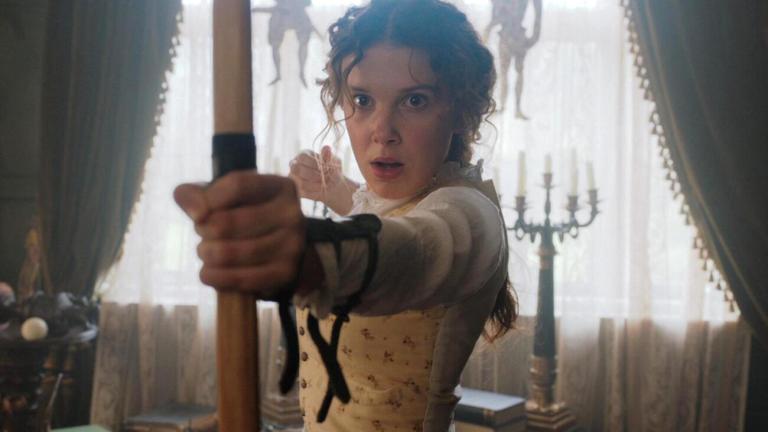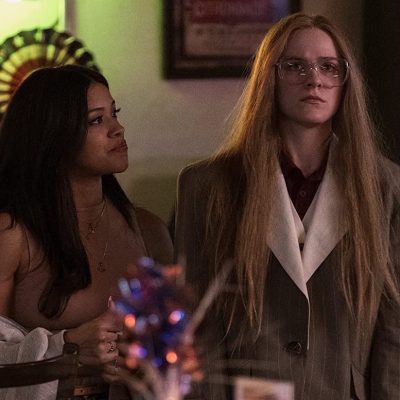Enola Holmes Review: Millie Bobby Brown’s Revolution Lacks Revelation
Netflix and Millie Bobby Brown’s spunky girl detective tweaks Sir Arthur Conan Doyle’s canon in Enola Holmes, a charming if overstuffed origin story.

Sherlock… Mycroft… and Enola! The Holmes siblings—we’re looking for a mind at work! It is easy to insert the names of Sir Arthur Conan Doyle’s famous detective and his brother—and their baby sister, Nancy Springer’s relatively recent creation—to the tune of “The Schuyler Sisters” from Hamilton. It’s just the sort of playful, futzing-with-lore vibe given off by Enola Holmes, Netflix’s feminist riff on Doyle’s canon. But unlike Lin-Manuel Miranda’s musical, the Netflix movie won’t stick in your memory beyond the credits. Still, it’s diverting fun with a valuable message for both its Victorian era women and contemporary young adult viewers.
Sixteen-year-old Enola Holmes (Stranger Things’ Millie Bobby Brown) grows up being told that she can do anything that she puts her mind to. And why not? Her sole role model is her mother Eudoria (Helena Bonham Carter), a brilliant artist and cryptographer who knows how to guard secrets with codes and her fists, and who rears Enola in the same interdisciplinary manner. Sequestered away from society in their family’s downtrodden country home with a limited and loyal staff, the two women enjoy their own bubble of safety and learning for learning’s sake.
It’s only when Eudoria disappears on Enola’s birthday, leaving behind a cryptic message, that the bubble pops. In come Enola’s older brothers Sherlock (Henry Cavill) and Mycroft (Sam Claflin), the latter to take her on as his ward and send her to a stultifying finishing school to catch up on all of the ladylike traits she (gasp) never inherited. Instead Enola wants to follow in Sherlock Holmes‘ footsteps, putting their considerable intellects together to locate Eudoria in London, but while the detective is sympathetic to her hurt and fear about their mother’s whereabouts, he does little to help her.
And so Enola is reminded of Eudoria’s seemingly cruel trick in giving her an anagram of a name that spelled backwards means alone. Not that it lasts long since Enola’s escape to London to find her mother soon intersects with the path of Viscount Lord Tewskbury, Marquess of Basilwether (Louis Patridge), and yet another mystery to solve arises with gunmen in pursuit. Try as she might to not get caught up in more intrigue, Enola nonetheless has danger literally stalking her just out of frame for all the times she offers droll asides to the camera.
Director Harry Bradbeer, who helmed almost every single episode of Fleabag, brings that series’ iconic fourth-wall break to Enola’s story, providing the loner girl with the closest thing to friends in an audience she engages with directly. Yet the device isn’t nearly as effective as when Phoebe Waller-Bridge does it, not least because Enola’s asides hardly ever shock. Despite being a fledgling detective, she’s surprisingly candid about her intentions to most everyone she meets, so when she makes eye contact with the camera, she’s rarely imparting new and shocking information or a drastically different read on a situation.
Enola shares her brother’s knack for disguises, shrewdly moving throughout London and the surrounding area in a variety of personas; an especially amusing recurring joke is when she frequently offers to trade outfits with random boys (sneakier than showing her face in a garment shop, and cheaper too). This code-switching across society allows her to convincingly occupy every role from newspaper boy to black-swathed widow, without any of them defining her. Because the real Enola is a patchwork of all of these identities.
While Enola clearly inherited the Holmes family’s wits, she lacks the real-world experience that hones such deductive skills, and winds up reacting just as much as anticipating new contacts and clues. It’s a refreshing change from mysteries in which Sherlock has all the answers, allowing the viewer to follow along with Enola as she explores Eudoria’s network of fellow revolutionary women and their ties to the suffragette movement. Yet once she uncovers signs of a greater conspiracy, Enola begins to wonder at her mother’s capacity for violence in the name of changing the world order.
By adapting the first of Springer’s popular YA novels and combining it with the period-appropriate conflict of women’s suffrage, Enola Holmes makes lofty pronouncements about changing long-established systems to make space for women and people of color. And some of it feels like terribly unsubtle lip service, at least to more cynical audiences, but one exchange stands out: Eudoria’s friend Edith (Susie Wokoma), who runs a tea shop and teaches jiu jitsu to young women on the top floor, challenges Sherlock that his apathy for helping his sister or mother is because the world as-is perfectly suits him—and he has the grace to look abashed.
This movie had the amusing unintentional PR boon of getting sued by the Conan Doyle estate for depicting Sherlock as having (dear me) emotions—a trait that does not exist in the public domain because the stories that did delve into his feelings are still under copyright for a few more years. Yet Cavill’s Sherlock arguably has a pretty limited character arc that could best be described as “begrudgingly affectionate,” while Claflin’s Mycroft is a delightful dandy who gets to sputter a few times but is mostly ineffectual. Both brothers could do with more screen time, but because this is Enola’s coming-of-age story, they are mostly relegated to a few obligatory scenes.
Enola’s trail doesn’t lead her anywhere near Baker Street, probably because at this point in the story Sherlock is famously a solo detective and couldn’t possibly work with a partner; even his little sister spends the entire film convincing him of her mettle. While one might expect a sly Watson meet-cute by the end of the movie, it would seem that the filmmakers are saving that canonical touchpoint for potential future installments. It certainly would be amusing to see an Enola Holmes franchise in which Sherlock and Watson have cameos as their cases intersect with Enola’s, and in which Mycroft gets to be more of an obstacle to her fledgling career.
It takes the movie a noticeably long time to build to the interesting notion that a world-changing mystery is rooted in a seemingly mundane case. The movie zigzags so much between its two branching plots that by the time it sets up for its big showdown, viewers might feel a little out of step and not fully appreciate the payoff. That’s partly why even though Enola has her very own Captain Marvel “fall three times, get up four” moment, it lacks the emotional punch of Carol Danvers’ win over the patriarchy.
Like a sloppy cypher, Enola Holmes crams a few too many elements into one narrative, jumbling it in parts and lessening its overall effectiveness. But if this is just the first installment, then it is a promising beginning. There will always be a need for stories that carve out spaces in history for people other than white men, and a plucky girl detective who knows her way around a corset and a cryptograph is herself a much-needed role model.
Enola Holmes is available on Sept. 23 on Netflix.


